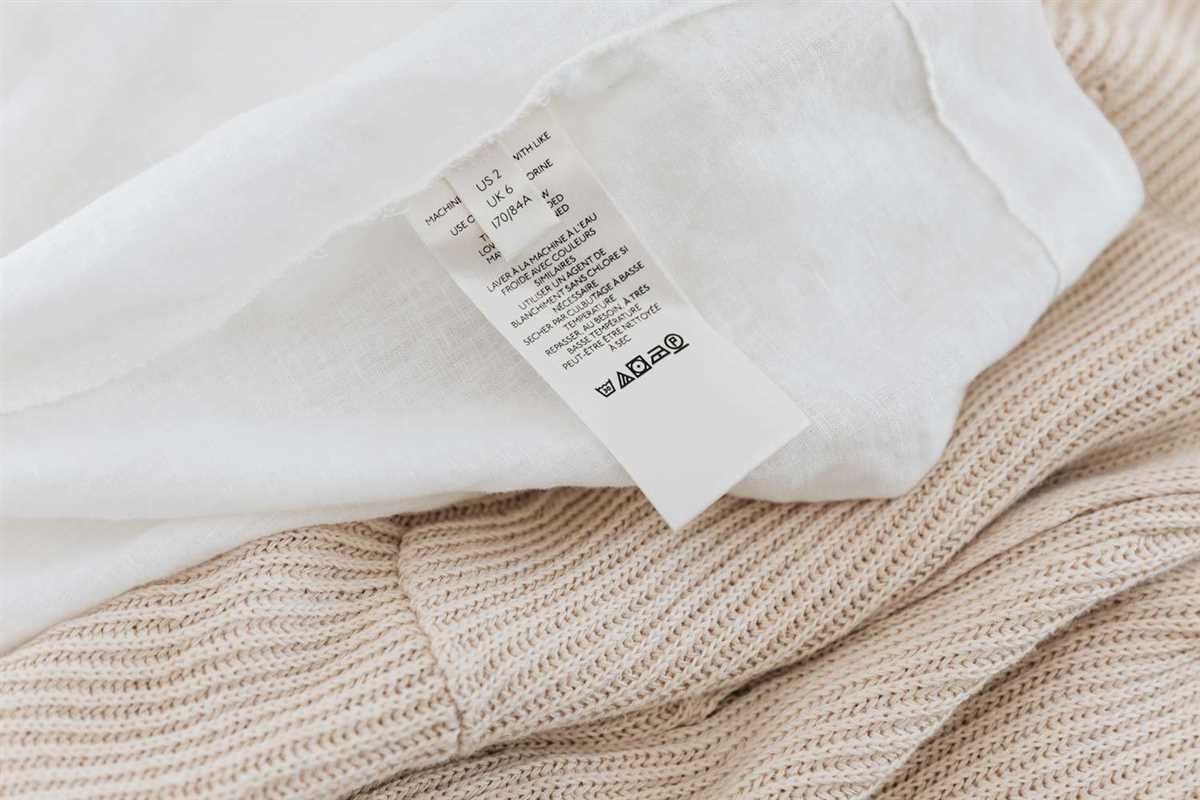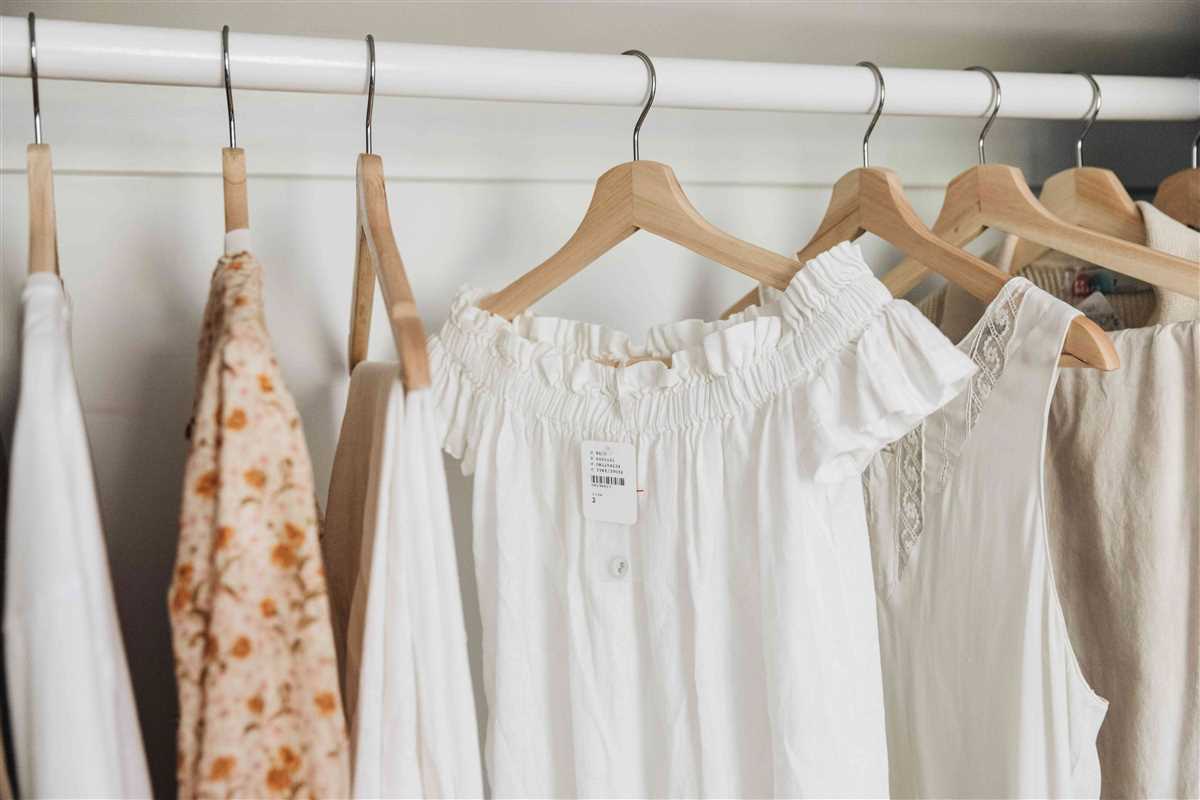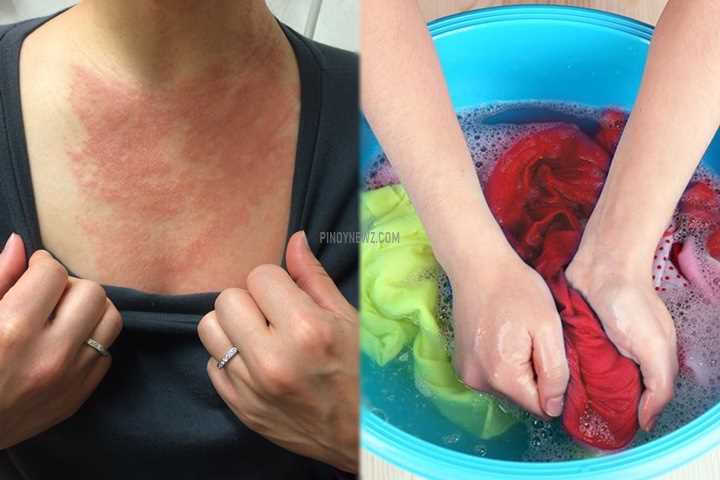




Buying new clothes is always exciting, but have you ever wondered if it’s necessary to wash them before putting them on?
According to experts, washing new clothes before wearing them can be beneficial for several reasons. First and foremost, it helps to remove any chemicals or dyes that may have been used in the manufacturing process. These chemicals can sometimes cause skin irritation or allergies, especially for those with sensitive skin.
Another reason to wash new clothes is to get rid of dirt and germs that may have accumulated during the production, transportation, or storage process. Many people try on new clothes before purchasing, and some may even return them after wearing them once. As a result, new clothes may carry bacteria and other contaminants that can be easily eliminated by washing.
However, not all new clothes need to be washed before wearing. Items like undergarments and swimwear are often recommended to be washed before use due to the close contact they have with our bodies. On the other hand, outerwear like jackets or coats may not require immediate washing unless visibly dirty or stained.
In summary, washing new clothes before wearing them can be a good practice to ensure cleanliness, eliminate potential irritants, and maintain hygiene. It is always better to be safe than sorry when it comes to taking care of your skin and overall health.
Should You Wash New Clothes Before Wearing Them? Expert Advice
When you buy new clothes, they may look clean and ready to wear, straight off the rack. However, many experts recommend washing new clothes before wearing them. Here’s why:
Bacterial and Chemical Residue
New clothes, especially those made from synthetic materials, may have been exposed to various chemicals and substances during the manufacturing process. These chemicals can include dyes, formaldehyde, and pesticides. Washing new clothes can help remove these residues, reducing the risk of skin irritation and allergies.
In addition, new clothes can accumulate bacteria while being handled and tried on by multiple people in stores. By washing new clothes before wearing them, you can eliminate any potential bacteria that may have been present.
Sizing and Shrinkage
New clothes may undergo some slight changes in size and shape after their first wash. Washing them before wearing allows the fabric to shrink or stretch, ensuring a better fit. This is especially important for garments made from natural fibers, as they tend to shrink more than synthetic materials.
Freshness and Comfort
Washing new clothes removes any odors that may have been acquired during storage and transportation. This helps make them feel and smell fresher when you finally wear them. Additionally, washing clothes can make them softer and more comfortable against your skin, enhancing your overall wearing experience.
To ensure proper washing of new clothes, always follow the care instructions on the garment’s label. Sort the clothes by color and fabric type and use a mild detergent. If there are specific stain or odor concerns, pre-treat the clothes before washing. After washing, dry the clothes according to the instructions to prevent any further shrinkage or damage.
Overall, while it may be tempting to wear new clothes immediately, taking the time to wash them before wearing can help ensure their cleanliness, comfort, and longevity. So, the next time you buy new clothes, consider giving them a quick wash before showing them off to the world.
Why You Should Consider Washing New Clothes

When you purchase new clothes, you may be eager to wear them right away. However, it is important to consider washing them before you put them on. Here are a few reasons why you should consider washing new clothes:
Bacteria and Germs
New clothes may have been tried on by multiple people before you purchased them. This means that they can harbor bacteria and germs. By washing new clothes before wearing them, you can eliminate these harmful microorganisms and reduce the risk of getting sick.
Chemicals and Irritants
New clothes often contain chemicals and irritants from the manufacturing process. These chemicals can cause skin irritation, itching, and allergic reactions. Washing new clothes helps to remove these substances and make them safer and more comfortable to wear.
Sizing and Fit
Washing new clothes can also help with sizing and fit. Many clothes undergo slight shrinkage or stretching during the manufacturing process or while on the store shelves. By washing new clothes, you can ensure that they fit properly and will not shrink or stretch further after you start wearing them.
Odor
New clothes sometimes have a strong smell due to chemicals, packaging, or storage conditions. Washing new clothes can help to freshen them up and eliminate any unpleasant odors, so you can enjoy wearing them from the moment you put them on.
Personal Preference

Finally, washing new clothes is a matter of personal preference. Some people simply feel more comfortable wearing clothes that have been freshly laundered and free from any potential contaminants. If you have sensitive skin or are particular about hygiene, washing new clothes is a sensible choice.
In conclusion, washing new clothes before wearing them is recommended for several reasons. It helps to eliminate bacteria and germs, removes chemicals and irritants, ensures proper sizing and fit, eliminates odor, and caters to personal preferences. So, next time you buy new clothes, consider giving them a wash before adding them to your wardrobe.
The Potential Risks of Not Washing New Clothes
While it may be tempting to wear new clothes right away, there are potential risks associated with not washing them before wearing. Here are some reasons why it is important to wash new clothes:
- Chemicals and Dyes: New clothes often contain chemicals and dyes that are used during the manufacturing process. These chemicals can cause skin irritation and allergic reactions, especially in individuals with sensitive skin. Washing new clothes helps to remove these chemicals, making them safer to wear.
- Bacteria and Germs: New clothes can harbor bacteria and germs that were picked up during the manufacturing, shipping, and storage process. These can include harmful bacteria such as E. coli and Staphylococcus aureus. Washing new clothes helps to eliminate these bacteria and prevent the risk of infection or illness.
- Dust and Allergens: New clothes can accumulate dust, pollen, and other allergens while being stored or transported. These allergens can trigger allergic reactions in individuals with sensitivities or allergies. Washing new clothes helps to remove these allergens, reducing the risk of an allergic reaction.
Overall, washing new clothes before wearing them is an important step to ensure that they are clean, safe, and free from potential irritants or allergens. It is especially important for individuals with sensitive skin or allergies to take this precaution.
Expert Recommendations for Washing New Clothes
1. Read the care label

Before washing your new clothes, always check the care label. The care label provides important information regarding washing instructions, including water temperature, recommended detergents, and any special care requirements. Follow the instructions on the care label to ensure the best results and to avoid damaging the garment.
2. Consider the fabric type

Different fabrics require different care. Some fabrics may be more delicate and may require gentle washing or hand washing, while others can withstand machine washing. Take into consideration the fabric type when deciding how to wash your new clothes. If you are uncertain about the fabric type, consult the care label or do some research to determine the best washing method.
3. Remove any non-washable parts
Before washing your new clothes, make sure to remove any non-washable parts such as detachable buttons, belts, or decorative accessories. These parts may get damaged or cause damage to the rest of the garment during the washing process. Set them aside and clean them separately, following the care instructions if available.
4. Pre-treat stains
If your new clothes have any visible stains, it’s a good idea to pre-treat them before washing. Use a stain remover or a mild detergent to treat the stains directly. Gently rub the stain remover into the fabric using a clean cloth or sponge. Let it sit for a few minutes before adding the garment to the washing machine.
5. Use a gentle detergent
When washing new clothes, it’s best to use a gentle detergent that is suitable for the fabric type. Avoid using harsh detergents or bleach, as they can damage the fabric and cause discoloration. Look for detergents specifically labeled for delicate or sensitive fabrics. These detergents are designed to be gentle on clothes while effectively removing dirt and stains.
6. Wash in cold water

Most new clothes can be safely washed in cold water. Cold water helps preserve the color and shape of the garment and reduces the risk of shrinking. However, always check the care label to see if there are any specific water temperature recommendations for the garment. If cold water is not advised, follow the instructions accordingly.
7. Air dry or tumble dry
After washing, consider how to dry your new clothes. Air drying is generally recommended to prevent damage from high heat or agitation in the dryer. If you choose to air dry, hang your clothes on a drying rack or clothesline away from direct sunlight to avoid fading. Alternatively, if the care label allows, you can tumble dry on a low or gentle cycle.
8. Iron or steam as necessary
Once your new clothes are dry, you may need to iron or steam them to remove any wrinkles and restore their appearance. Follow the care instructions regarding ironing temperature and steam settings. If in doubt, start with a lower heat setting and gradually increase if needed. Always iron or steam your clothes inside-out to protect the fabric from direct heat.
9. Store properly
After washing and drying your new clothes, make sure to store them properly to keep them in their best condition. Fold them neatly and place them in a drawer or hang them up in a wardrobe. Avoid overcrowding your clothes and try to provide adequate space to prevent creasing and wrinkling.
By following these expert recommendations for washing new clothes, you can ensure that your garments stay clean, fresh, and in good condition for a longer period of time.
How to Properly Wash New Clothes
While it may be tempting to wear new clothes right out of the store, it is generally recommended to wash them before wearing them. This helps remove any chemicals, dyes, or residue that may be present from the manufacturing process. Here are some steps to properly wash new clothes:
Step 1: Read the Care Label
Before washing your new clothes, check the care label for any specific instructions or recommendations. Different fabrics and garments may require different washing methods and temperatures. Following the care label instructions will help prevent any damage to the clothes.
Step 2: Separate by Color
Sort your new clothes by color to prevent any potential bleeding or color transfer. Separate dark and light colors to avoid any mishaps while washing.
Step 3: Pre-Treat Stains
If you notice any stains or spots on your new clothes, gently pre-treat them before washing. Use a stain remover or mild detergent directly on the affected areas and let it sit for a few minutes before proceeding to wash.
Step 4: Choose the Right Detergent
Select a gentle laundry detergent specifically formulated for delicate or new clothing. Avoid using harsh detergents or bleach as they can damage the fabric or cause fading.
Step 5: Use Cold Water
When washing new clothes, it is best to use cold water. Cold water helps preserve the color and quality of the fabric while also preventing shrinkage. Check the care label for any temperature recommendations.
Step 6: Wash Inside Out
Turn your new clothes inside out before washing. This helps protect the outer surface of the fabric and prevent any fading or damage. It also allows the detergent to work directly on the inside of the garment where most of the dirt and sweat accumulate.
Step 7: Gentle Cycle

Set your washing machine to a gentle cycle to ensure that the clothes are not subjected to harsh agitation. This will help maintain the integrity of the fabric and prevent any unnecessary wear and tear.
Step 8: Avoid Overcrowding
Do not overcrowd the washing machine with too many new clothes at once. This can lead to inadequate cleaning and prevent the detergent from properly penetrating the fabric. Leave enough space for the clothes to move freely and allow for thorough cleaning.
Step 9: Skip the Dryer
Avoid using the dryer for new clothes, especially if they are made of delicate fabrics. Instead, air dry them by laying them flat or hanging them up. This helps prevent shrinkage, stretching, or any damage that may occur from the heat of the dryer.
Step 10: Iron or Steam, if Necessary
Finally, if your new clothes are wrinkled after washing and drying, you can gently iron or steam them to remove any creases. Follow the care label instructions for ironing temperature and always use a pressing cloth to protect the fabric.
By following these steps, you can properly wash your new clothes and ensure that they are clean, fresh, and ready to be worn without any potential irritants or chemicals affecting your skin.
Common Misconceptions About Washing New Clothes
1. New Clothes Are Always Clean
One common misconception is that new clothes are automatically clean and ready to wear straight from the store. However, this is not always the case. New clothes may have been tried on by numerous people before you purchased them, which means they could have been exposed to germs, bacteria, and other contaminants.
2. Washing New Clothes Will Ruin Them
Some people believe that washing new clothes will ruin the fabric or cause them to lose their shape or colour. While it’s true that excessively harsh washing methods or using the wrong detergent can damage clothing, following the manufacturer’s care instructions and using a gentle cycle will ensure that your new clothes stay in good condition.
3. Dry Cleaning is Sufficient
Many individuals think that sending their new clothes to the dry cleaner’s is enough to make them fresh and ready to wear. However, dry cleaning may not remove all the chemicals, pesticides, or other residues that might be present on new clothes. It is always best to wash new clothes, regardless of whether they require dry cleaning or not.
4. New Clothes Don’t Shrink
Another misconception is that new clothes won’t shrink in the wash because they haven’t been worn or washed before. However, some fabrics have a tendency to shrink, especially if they contain natural fibers like cotton. Washing new clothes before wearing them can help prevent any unexpected shrinkage.
5. Storing New Clothes is Enough
While it’s true that storing new clothes in a clean and dry place can help keep them fresh, it doesn’t eliminate the need for washing. Even if the clothes appear to be clean and unused, they can still harbor bacteria or other pollutants that could irritate your skin. Properly washing new clothes is an essential step to ensure they are truly clean and ready for use.
6. New Clothes Smell Fresh
Many people assume that new clothes have a clean and fresh smell, but this isn’t always the case. The packaging materials used in shipping and storing new clothes can leave behind unpleasant odors that may not be evident until the clothes are worn. Washing new clothes can help eliminate any unwanted smells and leave them smelling fresh.
FAQ
Why should I wash new clothes before wearing them?
It is recommended to wash new clothes before wearing them to remove any chemicals, dyes, or residues that may be present from the manufacturing process. These substances can cause skin irritation or allergic reactions.
What kind of chemicals are present in new clothes?
New clothes may contain chemicals such as formaldehyde, which is commonly used in the manufacturing process to prevent wrinkling. Other chemicals that may be present include dyes, pesticides, and flame retardants. Washing the clothes helps to remove these substances.
Can’t I trust that new clothes are safe to wear without washing them?
While regulations are in place to ensure the safety of clothing, it is still recommended to wash new clothes before wearing them. This is because regulations may not cover all substances, and individual sensitivities can vary. Washing the clothes helps to remove any potentially harmful substances.
What is the best way to wash new clothes?
It is best to follow the care instructions on the clothing label when washing new clothes. Generally, using a mild detergent and washing the clothes on a gentle cycle with cold water is recommended. Avoid using bleach or harsh chemicals, as these can damage the clothes.
Should I wash new clothes separately from other laundry?
It is a good idea to wash new clothes separately from other laundry, especially if the clothes are brightly colored or if there is a chance that they may bleed. This helps to prevent the transfer of color to other clothes. You can also use color-catching sheets or laundry pods to absorb any color bleed.
















